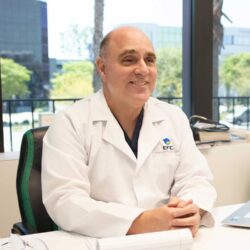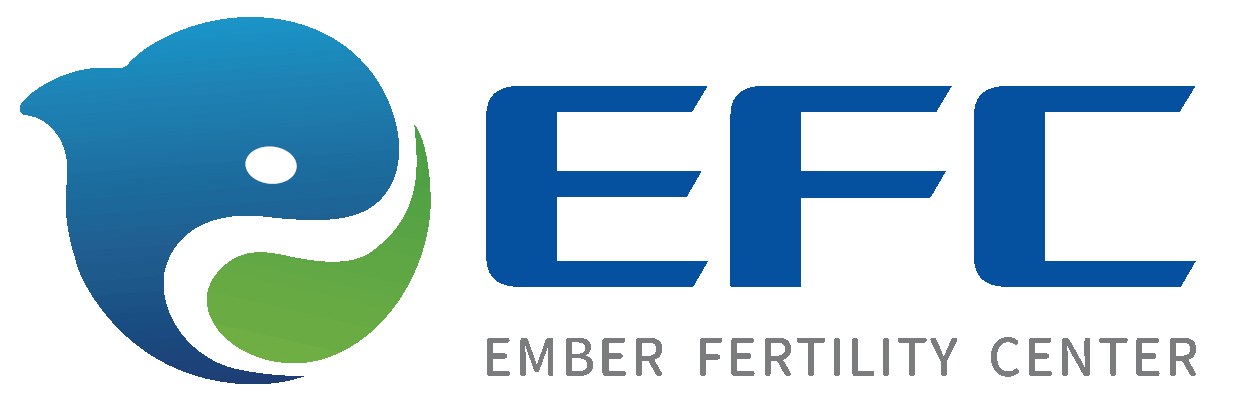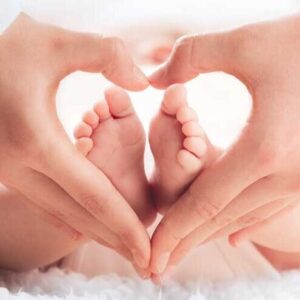Key points about advanced maternal age & fertility
- A woman’s age when trying to conceive is the most important factor in her fertility success.
- As a woman ages, her ovarian reserve degrades naturally, which is the quality and quantity of her eggs.
- For example, a woman under age 30 has an 85% chance of conception within a year; a woman at age 40 has a 44% chance.
- With more women delaying family until later in life, experts believe the lack of understanding about the effects of age on fertility can alter their prospects for success.
- While it is possible to have children naturally in the later stages of reproductive age, many if not most women will need fertility treatments to have a child.

At Ember, everyone is a VIP – very important patient
And we have a thing for the small things: Each Ember patient gets a dedicated fertility coordinator, a patient’s personal care guide through every clinic detail, from the very first phone call to meeting your little miracle. Schedule your appointment today using our online self-scheduling tool.
Advanced maternal age: a woman’s biological clock
Most people are familiar with the term biological clock, which in the case of women and fertility refers to their natural decline in fertility. What many people do not grasp is how drastically that decline can affect a woman’s, or transgender man’s, ability to both conceive and carry a pregnancy to a successful birth of a healthy child.
The ongoing trend of women and couples delaying having children until later in life for any number of reasons represents a challenge to those people having a child naturally, as well as with fertility treatments. Fertility treatments cannot always overcome that obstacle.
Here’s how a recent study cited by the National Library of Medicine marks that decline.
- A woman below age 30 has an 85% chance of getting pregnant in a year of unprotected intercourse.
- At age 30, the chance is 75%.
- At 35, 66%.
- At 40, 44%.
As the years tick by, so does the chance of pregnancy due to the effects of age on her eggs and the ovaries that produce them.
The negative effect of advanced maternal age doesn’t stop at conception. Older women are more likely to have a miscarriage after getting pregnant. About 16% of pregnant woman age 30 or younger have a miscarriage and that figure rises to 27% for a 40-year-old pregnant woman.
Female egg decline and ovarian reserve
Even before birth, a female has all the eggs she will ever have, as no eggs are produced afterward. That is a fact, so is the continual decrease in the quantity of eggs through menstruation and natural aging.
Her ovarian reserve declines, meaning she has fewer eggs in store and the number of healthy eggs likely to result in pregnancy also declines. These declines are primarily due to genetic factors that result in abnormal chromosomes. The rate of the decline in quality and quantity is different for individual women.
There is nothing any woman can do to change any of these natural processes. While making healthy lifestyle choices can improve one’s chances of successful pregnancy, that will not change the ovarian decline.
Other effects of advanced maternal age on fertility & pregnancy
Other aspects of advanced maternal age can make it difficult or impossible to become pregnant naturally. The American College of Obstetricians and Gynecologists notes that with age, women are more apt to develop conditions unfavorable to conception. These include uterine fibroids and endometriosis.
Age also increases potential for ovulation problems in women, which have a direct impact on fertility. As the uterus ages, it also becomes more susceptible to conditions unfavorable for healthy pregnancy.
Once pregnant, women of advanced maternal age are more likely to have complications such as gestational diabetes, genetic disorders and high blood pressure. They also have a higher risk of an ectopic pregnancy, which is a pregnancy outside the uterus that is untenable. The health of the older pregnant mother’s fetus and subsequent child also faces higher risks.
Causes of advanced maternal age fertility difficulties
Why advanced maternal age has such negative effects on having a healthy pregnancy and child isn’t completely understood. But various kinds of genetic issues are thought to be at play, including DNA damage and genetic mutations among others.
Fertility test for women of advanced maternal age
What we do know for certain is that women of an older age concerned about their chance of having a child should consider fertility testing. We advise those age 35 and older to seek help from a fertility specialist if they have not succeeded in child birth after six months of trying. For those over 40 or with known fertility issues, an evaluation should be their first step.
Following are tests we can conduct to help women get a good idea of their fertility potential.
- Physical exam & medical history.
- Ultrasound for abnormalities or conditions such as polycystic ovary syndrome.
- Ovarian reserve testing.
- Antral follicle count.
- Tests for levels of reproductive hormones like the anti-Müllerian hormone and follicle stimulating hormone.
- Hysterosalpingogram and sonohysterogram to evaluate the fallopian tubes and uterus.
- Other tests including hysteroscopy and laparoscopy may be needed.
Dr. William Freije’s expertise in fertility treatment

Fertility specialties
- In vitro fertilization (IVF) & IVF lab techniques
- Elective single embryo transfer
- Preimplantation genetic testing (PGT-A, PGT-M)
- Fertility preservation/egg freezing
- LGBTQIA+ family planning and third-party reproduction, including gestational carriers (surrogates)
Dr. Freije is double board certifie d in reproductive endocrinology & infertility (REI) and OB-GYN.
He has a Ph.D. in human genetics, giving him exceptional insights into this important factor of advanced maternal age fertility challenges.
He is an assistant clinical professor at UCLA’s department of obstetrics and gynecology, helping train the next generation of OB-GYNs.
Dr. Freije is an expert with considerable experience in fertility research and has made many presentations on infertility, genetics and IVF lab techniques.
Fertility treatment options for women of advanced maternal age
If fertility testing indicates the patient of advanced maternal age will need help getting pregnant, we have several options. Which to turn to first depends on the cause of the problem. When testing does not pinpoint the exact cause, we may give a diagnosis of unexplained infertility.
In either of these cases, the following treatments recommended by The American Society for Reproductive Medicine (ASRM) may result in successful pregnancy.
Ovulation induction with IUI
Ovulation induction, also called superovulation, with timed IUI (intrauterine insemination) is the least invasive treatment option. This involves medications to promote production of multiple eggs, then inserting the partner’s (or a donor’s) sperm that has been collected and washed into the uterus.
Advanced maternal age and IVF success
We may recommend IVF either as a first step or if the above does not succeed. The success of IVF is also related to advanced maternal age. The Society for Assisted Reproductive Technology reports the following national IVF success rates* for women using their own eggs.
- For women younger than 35: 51.1% chance of live birth.
- For those ages 35-37: 38.6%.
- 38-40: 24.8%.
- 41-42: 12.8%.
- Older than 42: 3.9%.
*Defined as live birth per intended egg retrieval (for all embryos)
Egg donation
Egg donation involves fertilizing a donated, healthy egg from a donor and transferring the resulting embryo to the intended mother’s uterus. ASRM notes that turning to egg donation is a good option, particular for women over age 42 who have not had success with the treatments above. This is also true for women with premature ovarian failure, also known as early menopause.




